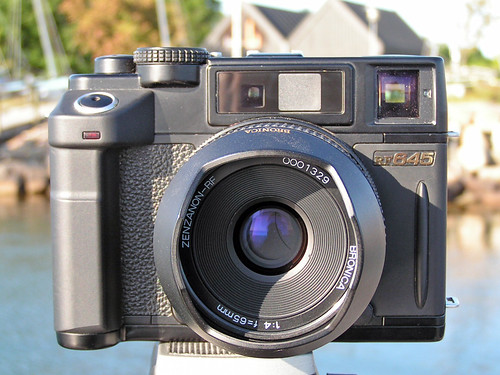Difference between revisions of "Bronica RF645"
(Add more details in the features) |
|||
| Line 10: | Line 10: | ||
| − | Camera design | + | ===Camera design=== |
The relatively classic design of a rangefinder camera has been enhanced with modern techniques | The relatively classic design of a rangefinder camera has been enhanced with modern techniques | ||
| Line 18: | Line 18: | ||
Most notable features include | Most notable features include | ||
| − | + | * vertical ("portrait") framing due to horizontal film movement, much like earlier foldings | |
| − | + | * leaf shutter lenses with no mechanical cocking from the body (a motor built into the lens does this instead) | |
| − | + | * automatic dark slide when lens is removed : a cloth curtain unfolds to protect the film from exposure | |
| − | + | * center weighted average metering (non TTL), adapting to the focal length mounted on the body | |
| − | + | * Program mode where the body sets the aperture in the lens electronically | |
| − | Viewfinder | + | ===Viewfinder=== |
The vertical viewfinder is a good design, offering clear vision, distinct patch and good resistance | The vertical viewfinder is a good design, offering clear vision, distinct patch and good resistance | ||
| Line 31: | Line 31: | ||
| − | Lenses | + | ===Lenses=== |
At the time the camera was issued, three lenses were advertised : 45mm/4, 65mm/5 and 135mm/4.5. | At the time the camera was issued, three lenses were advertised : 45mm/4, 65mm/5 and 135mm/4.5. | ||
Revision as of 09:06, 3 January 2010
The Bronica RF645 is a medium format rangefinder with interchangeable lenses made by the Japanese company Bronica. It captures 6×4.5 images onto 120 or 220 film.
 
|
| Pictures by Hans Marvell. (Image rights) |
Contents
Camera design
The relatively classic design of a rangefinder camera has been enhanced with modern techniques and some very innovative choices. The body and lens communicate with each other through a mechanical rangefinder coupling and electronic contacts for lens identification, aperture setting and shutter release.
Most notable features include
- vertical ("portrait") framing due to horizontal film movement, much like earlier foldings
- leaf shutter lenses with no mechanical cocking from the body (a motor built into the lens does this instead)
- automatic dark slide when lens is removed : a cloth curtain unfolds to protect the film from exposure
- center weighted average metering (non TTL), adapting to the focal length mounted on the body
- Program mode where the body sets the aperture in the lens electronically
Viewfinder
The vertical viewfinder is a good design, offering clear vision, distinct patch and good resistance to flare. Frames for 65mm and 100mm lenses are available (and 135mm on early models), and are paralax-compensated. An additional external finder is provided for the 45mm lens.
Lenses
At the time the camera was issued, three lenses were advertised : 45mm/4, 65mm/5 and 135mm/4.5. Shortly after that a 100mm was announced to replace the 135mm which was too difficult to focus on some bodies. All lenses seem to have very good reputation in terms of sharpness and bokeh.
Links
In English: